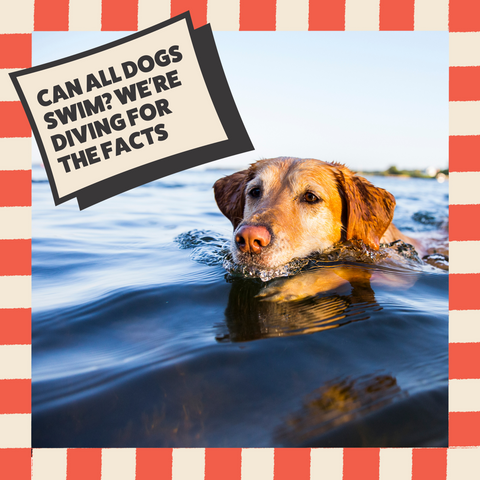Slobber & Chops Guide: Can Dogs Eat Fruit?
Healthy Treats, Can Dogs Eat Fruit?
The answer to the question ‘Can dogs eat fruit?’ is... generally yes, dogs can. But there are some important considerations to keep in mind. And some important exceptions to the rule!
Top Tip: Scroll to the bottom of the page for a handy summary table!
There is some ongoing scientific debate about whether dogs should be categorised as being carnivores or omnivores. Dogs do share some genetic traits with their ancestors, the wolf, but their dietary requirements have adapted over time as they have become more domesticated.
Our scientific understanding of dogs is always evolving and improving. Modern research has highlighted that while dogs do benefit from consuming meat, they are also able to safely consume and digest some plant-based foods and do indeed benefit from the additional nutrient content of fruits and vegetables. In the natural section of your local pet shop, you may even find some dehydrated fruit treats for your dog!
Always feed a 'balanced and complete' diet
In an ideal world, your dog should always get the lion’s share of his or her daily essential nutritional requirement from a quality, balanced ‘carnivorous’ pet food. Although fruit contains vitamin C, dogs produce this naturally so they don’t need a dietary supplement (unless they are suffering from heart disease in which case supplementation may be beneficial).
However, it is often the case that owners will want to complement their dog’s diet with ‘human’ food from time to time. Occasionally sharing leftovers or providing human food as a treat is OK but it’s important that the food we give to our dogs is not harmful for them to eat. A dog’s digestive system is sensitive and quite different to that of a human, so whilst many human foods are completely safe to feed to your dog, others are very dangerous.
It’s also worth noting here that it is widely agreed that if feeding your dog fresh fruit as a treat then separate the fruit treats out from the protein-based meals as they are digested at a faster rate.
Read on to find what fruits you can safely treat your dog with and which ones should be avoided.
Please remember that even when supplement your dog’s diet with fruit from the safe list, all new foods should be introduced slowly and after consultation with a vet or canine nutritionist. This is especially important with puppies as their stomachs are still growing and can be extra sensitive. Even with the many fruits that dogs can safely eat, it’s important to practice moderation. Treats and snacks should not make up more than ten percent of your dog’s calorific intake.
Finally, always ensure that any toxic parts of the fruit are first removed before giving them to your dog and be mindful of choking hazards such as seeds, pits, stones and skins.
Can dogs eat apples?
Yes, dogs can eat apples which are fantastic source of vitamins A and C as well as dietary fibre. They are low in protein and fat making them a great snack or treat for older dogs. Apples are also a fab way to keep your dog's teeth clean and can also help to freshen doggy breath.
However, always remove the core and seeds of the apple before feeding to your dog, since both contain a very small amount of cyanide. Swallowing a couple of pips is unlikely to bring about a problem since such a small amount of cyanide is quickly metabolised, but it’s better to remove them and do away with the risk.
Can dogs eat apricots?
Yes, dogs can eat ripe or dried apricots provided the stone, leaves and stem of the fruit (which are toxic to dogs) have been first completely removed.
Whilst the fruit is sweet and juicy, and packed with fibre, potassium and cancer-fighting beta carotene, apricot stones contain cyanide and can cause intestinal blockages if swallowed.
Too many apricots in one go may well provide too much fibre and could cause digestive upset so don’t overdo it when you get those puppy dog eyes looking to share your Scooby snacks.
Can dogs eat bananas?
Yes, dogs can safely eat bananas. Low in cholesterol and sodium, when fed in limited amounts, bananas are a superb natural alternative to shop-bought treats.
High in vitamins, potassium, biotin, copper and fibre they bring to the table many nutritional benefits but because of their high sugar content, bananas should be fed in moderation.
Can dogs eat blueberries?
Yes, dogs can eat blueberries. Considered a ‘superfood’ for humans and dogs alike, blueberries are rich in antioxidants which are great when it comes to boosting immunity and preventing cell damage. They are also abundant in fibre and phytochemicals.
Teaching your pup to catch food in the air is a fun and easy trick and a great way to encourage bonding, as well as improving the dog’s listening skills.
Its also a fun trick to show off with your friends!
What are Phytochemicals?
Phytochemicals are compounds that may prevent cell mutations. They are found in fruits, vegetables, grains, beans, and other plants. Some of these phytochemicals are believed to protect cells from damage that could lead to cancer. They are naturally formed in plants as they grow.
These chemicals are found in significantly high levels in certain plant and fruits like blueberries!
Can dogs eat cherries?
No, dogs should not eat cherries as cherries are toxic to dogs.
The pits, stems and leaves of cherries contain cyanide which can cause poisoning if consumed in large quantities by dogs. When dogs ingest significant quantities of cyanide, the cyanide disrupts cellular oxygen transport, which in simple terms means that the dog’s cells can’t get enough oxygen.
Symptoms of cyanide poisoning to look out for if your dog has eaten cherries include dilated pupils, difficulty breathing, and red gums. More on cyanide below.
Cherry pits are also a problem for dogs, as they can cause intestinal obstruction.
If your dog eats one or two cherries accidentally, it isn’t necessarily enough to do serious damage. It’s much more likely that pup will suffer a tummy upset than cyanide poisoning but if your dog has eaten cherries, the advice would always be to call your vet for advice, regardless of whether they are showing symptoms or not.
There lots of alternatives to cherries providing similar health benefits so there is really no need to take the risk of giving dogs cherries to eat.
What is Cyanide?
Cyanide is a chemical naturally formed within the seeds of specific fruit. In some fruits these seeds are within a 'pit' or 'stone' and in some plants. Cyanide can be found in all sorts of plants from bamboo shoots to butter beans. It is considered toxic and at certain concentrations fatal. When some cyanide compounds are mixed with acid they form hydrogen cyanide which is highly toxic.
Digestion in animals including, dogs and humans, uses strong acid in the stomach. This is why ingesting certain pits, stones or seeds from some fruits is a concern for the health of your dog. The main location of cyanide is in the seed, which is inside the pit or stone in some fruit.
The amount ingested and size of the dog are all factors that influence the level of toxicity in individual cases.
Cyanide poisoning in dogs may cause, salivation, rapid and/or difficulty breathing, convulsions and paralysis. Your dog's gums may also turn bright red, indicating that oxygen in the blood is not being absorbed into the cells.
If you have any concerns about a potential cyanide poisoning please call your vet immediately.
Can dogs eat cranberries?
Yes, both fresh cranberries and dried cranberries are okay for dogs to eat in moderate amounts. Whether or not your best friend’s sensitive nose will want to go anywhere near a cranberry is another matter since they have an extremely tart and fruity aroma.
Cranberries contain vitamins A, C, E and K as well as a host of minerals such as calcium, magnesium, potassium and phosphorous. They are a good source of fibre and antioxidants and contain proanthocyanins which may be a proactive measure in helping to prevent urinary tract infections and maintaining bladder health.
Do consider that dried cranberries, whilst safe, contain much higher levels of sugar than fresh cranberries, and as with any fruit treat, too many cranberries can cause digestive upset. So, for optimum health and to keep tails wagging, curb your canine’s cranberry consumption for optimum health.
Can dogs eat grapes?
No, dogs should never eat grapes of any colour or raisins (dried grapes - see below). Grapes and raisins are highly toxic and the toxic reaction they can cause in dogs can lead to severe complications as well and sudden and acute kidney damage.
Although the cause of their toxicity is largely unknown, it affects all breeds and ages. Common symptoms of a toxic reaction include, but are not limited to, vomiting, diarrhoea, tiredness, weakness, loss of appetite and seizures.
Always seek your vet’s advice if your dog has consumed even a small amount.
Can dogs eat kiwi fruit?
Yes, it is perfectly safe for dogs to eat kiwi fruit as an occasional treat as long as some simple guidelines are followed. The skin and seeds of the fruit should always be removed as the skin can cause a choking hazard and the seeds are toxic if ingested in excessive amounts.
Kiwi fruit contains healthy amounts of fibre, vitamin A, vitamin C and potassium as well as antioxidants which help protect against cancer, boost cell rejuvenation and strengthen the immune system. Kiwi fruit is a tasty food to many dogs and may be a useful fruit to tempt the fussy eater with.
However, it can cause canine tummy upsets and its high fibre content may have a laxative effect on dogs. For this reason, as with all new foods, kiwi fruit should be introduced into your dog’s diet slowly.
Can dogs eat lemons?
No, dogs should not eat lemons. Citrus fruits contain organic chemical compounds called psoralens. These can be found throughout the lemon. Psoralens compounds have the highest concentration in the skin, seeds and pith of lemons. When ingested, psoralens can cause a variety of unpleasant and potentially severe symptoms in dogs depending on the quantity consumed.
Depending on the size of the dog, one lemon is likely to cause vomiting and diarrhoea but if a significantly larger amount of psoralens is ingested (or in smaller dogs), they may suffer from sensitivity to light, tremors and the inability to walk.
If this is the case, veterinary intervention is immediately required.
Can dogs eat mango?
Yes, this exotic summer fruit which is a great source of vitamins A, B6, C and E is okay for your dog to eat occasionally. Mangoes also a source of potassium and both alpha and beta carotene.
Make sure you peel this sweet treat before giving it to your dog and as with most fruits, ensure you remove the hard pit first as not only is it a choking hazard, it also contains a small amount of cyanide.
As mangoes are high in sugar, only feed a couple of slices or a few cubes to your dog as a special treat from time to time.
Can dogs eat orange?
Dogs can eat oranges? Yes, in moderation, but getting their sensitive noses to go anywhere near strong-smelling citrus fruits may be a whole new ball game!
When offering your dog orange, first remove the peel and only offer her the fleshy part of the orange minus any seeds. Oranges provide excellent nutritional benefit from the vitamin C, potassium and fibre they contain, but the peel is quite unforgiving on dogs’ digestive systems and may cause stomach upset.
Please do also consider the relatively high sugar and calorific content of oranges when choosing treats for your dog. Orange is sometimes used in dog food.
Can dogs eat peaches?
Yes, fresh or frozen peaches are a safe and delicious summer treat for dogs to eat in small quantities so long as you remove the stone and cut up the flesh into easily digestible pieces.
The stone contains cyanide and can present a choking hazard. In addition, the stones are very hard and jagged and can damage the mouth or internal organs. Peaches are a wonderful source of vitamin A and fibre and as long as they are prepared properly, they are an excellent and refreshing reward during summer training sessions.
Avoid tinned peaches as they usually contain high amounts of sugary syrup.
Can dogs eat pears?
Yes, dogs can eat pears which are packed with copper and vitamins C and K as well as being high in fibre.
It is advisable to remove the core and seeds and to cut the pear into bite-size chunks as similar to apples, the seeds contain traces of cyanide.
Avoid tinned pears with syrup as these are also very high in sugars.
Can dogs eat pineapple?
Yes, a few chunks of fresh, raw pineapple is a wonderful tropical treat for your best friend so long as the prickly outer skin and crown (the amazing name for the leaves on top of the fruit) are first removed.
Pineapple contains a big boost of vitamins, minerals and fibre as well as the enzyme bromelain which facilitates easier absorption of proteins in dogs.
Can dogs eat plums?
Plum flesh in itself is safe, however the plum stone is potentially toxic to dogs and the leaves and branches of the plant are highly toxic thanks to their cyanide content.
Plums also contain a lot of sugar so aren’t the most ideal snack for dogs.
For this reason and because it’s better to be safe than sorry, avoid giving plums to your dog altogether.
Can dogs eat raisins?
No, dogs must not eat raisins. Raisins are dried grapes. See grapes above.
Be particularly mindful at Christmas that foods such as Christmas cake, mince pies and fruit contain large quantities of dried fruit. Do ensure that this kind of human food is not accessible to your pets and that your guests do not feed Fido with their leftovers.
Raisins are highly toxic and the toxic reaction they can cause in dogs can lead to severe complications as well and sudden and acute kidney damage.
Although the cause of their toxicity is largely unknown, it affects all breeds and ages. Common symptoms of a toxic reaction include, but are not limited to, vomiting, diarrhoea, tiredness, weakness, loss of appetite and seizures.
Always seek your vet’s advice if your dog has consumed even a small amount.
Can dogs eat Raspberries?
Absolutely, raspberries are safe for dogs to eat in moderation. Low in sugar and calories, raspberries contain powerful antioxidants and have great anti-inflammatory properties making them a good fruity little number for older or senior dogs with aging joints.
Raspberries are high in vitamin C, manganese, and fibre but as they contain small amounts of , do limit their intake at any one time.
What is Xylitol?
Xylitol is used in many ‘diet’ or low-sugar foods as a sweetener. While harmless to humans it can be toxic to dogs at certain levels. You may well have read about Xylitol in relation to chewing gum and peanut butter. The level at which xylitol is present in raspberries is 0.0004g per 1.0g of fresh fruit weight.
Compare this to the average piece of chewing gum containing 0.009g per piece of gum and that’s over 22 times the amount in a gram of raspberries.
Can dogs eat strawberries?
Most certainly dogs can eat strawberries and the majority of our four-legged friends find them a delicious treat! Strawberries are a fantastic fruity source of vitamins B1, B6 and C as well as containing potassium, manganese and fibre to support the immune system and aid the dog’s digestion.
Giving your pup a frozen strawberry or two to chew on is also a natural way to give your dog’s teeth a makeover since the humble strawberry contains an enzyme that can help whiten your dog’s teeth.
Just be aware that you should only feed strawberries in moderation because their high sugar content, although natural sugar, is still undesirable.
Can dogs eat tomatoes?
However you pronounce it, tomatoes are fruits, botanically speaking. These fruits are considered vegetables by nutritionists. Botanically: 'a fruit is a ripened flower ovary and contains seeds.' Glad we cleared that up.
Unfortunately the tomato debate goes deeper than just fruit vs veg and the pronunciation...
Part of the nightshade family, tomatoes may contain solanine and/or tomatine. Both of these are considered toxic to dogs in 'large' quantities.
While it is considered safe for your dog to eat fresh ripe, red tomatoes with the exception of the stems and leaves. If you have any concerns leave them off the menu. Also note that 'green' and unripe tomatoes have the potential for higher concentrations of these chemicals.
In addition there are more grey areas as some professionals claim that 'Tomatine' is sometimes confused with the glycoalkaloid 'solanine', which is found in potatoes, particularly green ones.
The current scientific thinking is:
Solanine can be toxic for dogs in large quantities.
Tomatine can be toxic for dogs in large quantities.
What is Solanine?
Solanine is a naturally forming poison found in species of the nightshade family of plants within the genus Solanum. This genus includes often eaten plants such as the potato (Solanum tuberosum), the tomato - see above - (Solanum lycopersicum), and the eggplant (Solanum melongena). It can form naturally in any part of the plant, including the leaves, fruit, and tubers. It also forms in different quantities depending on the plant. Solanine is useful to the plant due to it's fungicidal and pesticidal properties.
Some professionals claim that 'Tomatine' is sometimes confused with the glycoalkaloid solanine, which is found in potatoes, particularly green ones. We will have to wait for more conclusive research for clarity on this.
Can dogs eat watermelon?
Yes, dogs can safely eat watermelon provided that the rind and skin are first removed as these can cause intestinal blockage. Because of its high water content, giving your dog chilled watermelon flesh is a fun wonderful way to keep your dog well hydrated on a hot summer day.
It is also perfectly safe to feed your dog cantaloupe and honey dew melon. Just like watermelon, these types of melon are packed with nutrients, low in calories and a fantastic source of water and fibre. However, cantaloupe and honey dew are high in sugar, so limit the frequency and portion size when treating your dog with this type of fruit, particularly overweight or diabetic dogs.
Dog treats and a healthy 'balanced and complete' diet
To conclude, if your pooch is already eating a balanced and complete diet, it’s absolutely fine to supplement it with small quantities of certain types of fruit as a treat, but moderation is key.
If you’re giving your dog fruit, remove all potential hazards (such as skin, cores, pips, seeds and stones) and remove any parts of the fruit that contain cyanide.
Be mindful that nature’s sweet treats contain natural sugar and always stick to the ten per cent rule when supplementing the diet.
Adding fruit to your dog’s diet will ensure that he or she is getting an abundance of essential dietary nutrients, such as vitamins and minerals which have wide-ranging benefits. Antioxidants are great for boosting immunity whilst the anti-inflammatory properties of many berries and leafy green veggies may ease the pain and discomfort of hip dysplasia, arthritis and spinal issues.
However, fruit is not a substitute for foods that are more nutritious for your dog.
Summary Table of Fruits
| Type of Fruit | Safe for Dogs? | Notes of Caution |
| Apple | Yes | Seeds and core removed |
| Apricot | Yes | Leaves, stem and stone removed |
| Banana | Yes | Only the flesh, skin removed |
| Blueberries | Yes |
|
| Cantaloupe | Yes | Remove rind and seeds |
| Cherries | No | Toxic to dogs |
| Cranberries | Yes |
|
| Grapes | No |
|
| Honeydew Melon | Yes | Remove rind and seeds |
| Kiwi Fruit | Yes | Skin and seeds removed |
| Lemon | No |
|
| Mango | Yes | Peel and remove pit |
| Orange | Yes | Remove the peel and seeds |
| Peach | Yes | Stone removed and flesh cut up into bite-sized pieces |
| Pear | Yes | Seeds and core removed |
| Pineapple | Yes | Outer skin and crown removed |
| Plums | No |
|
| Raisins | No |
|
| Raspberries | Yes |
|
| Strawberries | Yes |
|
| Tomato | Yes | Ripe, red fruit only - if concerned, avoid |
| Watermelon | Yes | Remove rind and seeds |
Want to know what's in your dog food?
Here at Slobber & Chops we are always keen to lean and explore all facets of health and wellbeing when it comes to dogs.
If you have ever wondered what's in your dog food or what those scientific words on the labels mean then have read of our 'Dog Food Jargon Buster' blog post!







